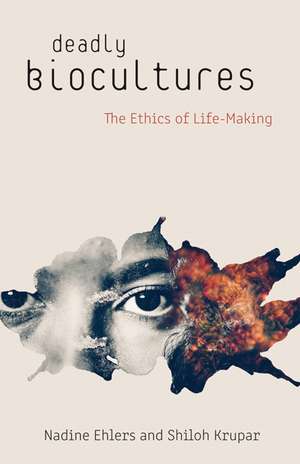Deadly Biocultures: The Ethics of Life-making
Autor Nadine Ehlers, Shiloh Kruparen Limba Engleză Paperback – 17 dec 2019
In their seemingly relentless pursuit of life, do contemporary U.S. “biocultures”—where biomedicine extends beyond the formal institutions of the clinic, hospital, and lab to everyday cultural practices—also engage in a deadly endeavor? Challenging us to question their implications, Deadly Biocultures shows that efforts to “make live” are accompanied by the twin operation of “let die”: they validate and enhance lives seen as economically viable, self-sustaining, productive, and oriented toward the future and optimism while reinforcing inequitable distributions of life based on race, class, gender, and dis/ability. Affirming life can obscure death, create deadly conditions, and even kill.
Deadly Biocultures examines the affirmation to hope, target, thrive, secure, and green in the respective biocultures of cancer, race-based health, fatness, aging, and the afterlife. Its chapters focus on specific practices, technologies, or techniques that ostensibly affirm life and suggest life’s inextricable links to capital but that also engender a politics of death and erasure. The authors ultimately ask: what alternative social forms and individual practices might be mapped onto or intersect with biomedicine for more equitable biofutures?
Preț: 178.19 lei
Nou
Puncte Express: 267
Preț estimativ în valută:
34.10€ • 35.33$ • 28.46£
34.10€ • 35.33$ • 28.46£
Carte disponibilă
Livrare economică 28 februarie-14 martie
Livrare express 14-20 februarie pentru 25.10 lei
Preluare comenzi: 021 569.72.76
Specificații
ISBN-13: 9781517905071
ISBN-10: 1517905079
Pagini: 288
Ilustrații: 16 b&w illustrations
Dimensiuni: 140 x 216 x 20 mm
Greutate: 0.37 kg
Ediția:1
Editura: University of Minnesota Press
Colecția Univ Of Minnesota Press
ISBN-10: 1517905079
Pagini: 288
Ilustrații: 16 b&w illustrations
Dimensiuni: 140 x 216 x 20 mm
Greutate: 0.37 kg
Ediția:1
Editura: University of Minnesota Press
Colecția Univ Of Minnesota Press
Notă biografică
Nadine Ehlers teaches sociology at the University of Sydney. She is author of Racial Imperatives: Discipline, Performativity, and Struggles against Subjection and coeditor of Subprime Health: Debt and Race in U.S. Medicine (Minnesota, 2017).
Shiloh Krupar is Provost’s Distinguished Associate Professor in the School of Foreign Service at Georgetown University, where she chairs the Culture and Politics Program. She is author of Hot Spotter’s Report: Military Fables of Toxic Waste (Minnesota, 2013).
Shiloh Krupar is Provost’s Distinguished Associate Professor in the School of Foreign Service at Georgetown University, where she chairs the Culture and Politics Program. She is author of Hot Spotter’s Report: Military Fables of Toxic Waste (Minnesota, 2013).
Recenzii
"Nadine Ehlers and Shiloh Krupar have written a brilliant book about the Janus-faced nature of neoliberal biopolitics. Focusing on a diverse range of topics, from race-based medicine to the ‘war on cancer,’ they superbly show how practices and technologies aimed at fostering life in liberal democratic regimes perversely produce vulnerability, death-in-life, and even death itself."—Jonathan Xavier Inda, author of Racial Prescriptions: Pharmaceuticals, Difference, and the Politics of Life
"Deadly Biocultures is a highly original and innovative text which aims to shed light on the dual nature of neoliberal biopolitics."—Ethnic and Racial Studies
"Deadly Biocultures offers a timely and provocative contribution to the rich literature on biopolitics from which it draws. Ehlers and Krupar provide unique examples and deep engagement with a wide array of American biocultures."—Disability Studies Quarterly
"Deadly Biocultures is a highly original and innovative text which aims to shed light on the dual nature of neoliberal biopolitics."—Ethnic and Racial Studies
"Deadly Biocultures offers a timely and provocative contribution to the rich literature on biopolitics from which it draws. Ehlers and Krupar provide unique examples and deep engagement with a wide array of American biocultures."—Disability Studies Quarterly
